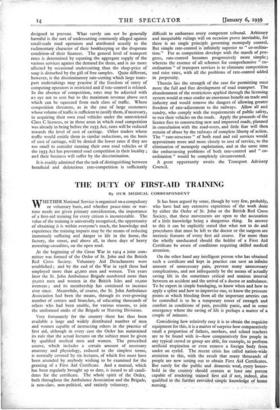THE DUTY OF FIRST-AID TRAINING
By OUR MEDICAL CORRESPONDENT
WHETHER National Service is organised on a compulsory or voluntary basis, and whether peace-time or war- time needs are given primary consideration, the importance of a first-aid training for every citizen is incontestable. The value of the training is universally recognised, the opportunity of obtaining it is within everyone's reach, the knowledge and experience the training imparts may be the means of reducing immensely suffering and danger to life in the home, the factory, the street, and above all, in these days of heavy motoring-casualties, on the open road.
At the beginning of the Great War in 1914 a joint com- mittee was formed of the Order of St. John and the British Red Cross Society. Voluntary Aid Detachments were established ; and by the end of the War in 1918 these had employed more than 45,000 men and women. Ten years later the St. John Ambulance Brigade numbered more than 5o,000 men and women in the British Isles and io,000 overseas ; and its membership has continued to increase ever since. Meanwhile, of course, the St. John Ambulance Association had been the means, through its ever-growing number of centres and branches, of educating thousands of others who had been unable, for various reasons, to join the uniformed ranks of the Brigade or Nursing Divisions.
Very fortunately for the country there has thus been available a large and widely distributed number of men and women capable of instructing others in the practice of first aid, although in every case the Order has maintained its rule that the actual lectures on the subject must be given by qualified medical men and women. The prescribed course, which includes a certain amount of necessary anatomy and physiology, reduced to the simplest terms, is normally covered by six lectures, of which five must have been attended by anybody wishing to be examined for the granting of a First Aid Certificate. And a manual, which has been regularly brought up to date, is issued to all candi- dates for the certificate. The whole spirit of the. Order, both throughout the Ambulance Association and the Brigade, is non-class, non-political, and -entirely yoluntary, It has been argued by some, though by very few, probably, who have had any extensive experience of the work done by either the Order of St. John or the British Red Cross Society, that these movements are open to the accusation of a little knowledge being a dangerous thing. In answer to this it can be explicitly stated that what not to do and procedures that must be left to the doctor or the surgeon are intrinsic features of every first aid course. Far more than the wholly uneducated should the holder of a First Aid Certificate be aware of conditions requiring skilled medical attention.
On the other hand any intelligent person who has obtained such a certificate and kept in practice can save an infinite amount of unnecessary pain, prevent many unnecessary complications, and not infrequently be the means of actually saving life in the sometimes critical and anxious interval between an accident and the arrival of a doctor or ambnlance. To be expert in simple bandaging, to know when and how to apply a splint and how to improvise one, to know the pressure points at which bleeding from all the important arteries can be controlled is to be a temporary tower of strength and comfort in conditions of pain, possible panic, and in some emergency where the saving of life is perhaps a matter of a couple of minutes.
Considering how relatively easy it is to obtain the requisite equipment for this, it is a matter of surprise how comparatively small a proportion of fathers, mothers, and school teachers are to be found with it—how comparatively few people in any typical crowd or group are able, for example, to perform artificial respiration or even remove a foreign body from under an eyelid. The recent crisis has called nation-wide attention to this, with the result that many thousands of people are now setting out to obtain First Aid Certificates. But surely for the public and . domestic weal, every house- hold in the country should contain at least one person capable of rendering ttained first aid if not, indeed, also qualified .in the furthe, provided simple knowledge of home nursing._ „..










































 Previous page
Previous page